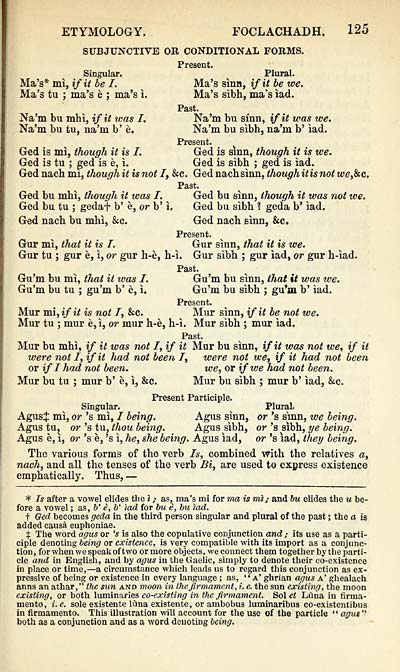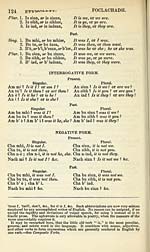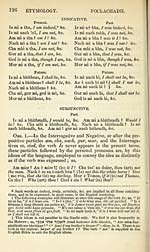Books and other items printed in Gaelic from 1841 to 1870 > Stéidhean a' Ghràmair Ghaëlig
(153) Page 125
Download files
Complete book:
Individual page:
Thumbnail gallery: Grid view | List view

ETYMOLOGY. FOCLACHADH. 125
SUBJUNCTIVE OR CONDITIONAL FORMS.
Present.
Singular. Plural.
Ma's* mì, ifit be I. Ma's sìnn, ifit be we.
Ma's tu ; ma's è ; ma's ì. Ma's sìbh, ma's ìad.
Past.
Na'm bu mhì, ifit was I. Na'm bu smn, ifit was we.
Na'm bu tu, na'm b' è. Na'm bu sìbh, na'm b' ìad.
Present.
Ged is mì, though it is I. Ged is sìnn, though it is we.
Ged is tu ; ged is è, ì. Ged is sìbh ; ged is ìad.
Gednachmi, thoughitisnot I, &c. Gedna,chsìnn i ihoughitisnotwe,kc.
Past.
Ged bu mhì, though it was I. Ged bu sìnn, though it was not we.
Ged bu tu ; gedaf b' è, or b' ì. Ged bu sìbh ? geda b' ìad.
Ged nach bu mhì, &c. Ged nach sìnn, &c.
Present.
Gur mì, that it is I. Gur sìnn, that it is we.
Gur tu ; gur è, ì, or gur h-è, h-ì. Gur sìbh ; gur ìad, or gur h-ìad.
Past.
Gu'm bu mì, that it was I. Gu'm bu sìnn, that it was we.
Gu'm bu tu ; gu'm b' è, ì. Gu'm bu sìbh ; gu'm b' ìad.
Present.
Mur mi, if it is not I, &c. Mur sìnn, ifit be not we.
Mur tu ; mur è, ì, or mur h-è, h-ì. Mur sìbh ; mur ìad.
Past.
Mur bu mhì, if it was not I, if it Mur bu sìnn, ifit was not we^ if it
were not I, if it had not been I, were not we, if it had not been
or iflhad not been. we, or ifwe had not been.
Mur bu tu ; mur b' è, ì, &c. Mur bu sìbh ; mur b' ìad, &c.
Present Participle.
Singular. Plural.
AgusJ mì, or 's mì, I being. Agus sìnn, or 's sinn, we being.
Agus tu, or 's tu, thou being. Agus sìbh, or 's sìbh, ye being.
Agus è, ì, or 's è, 's ì, he, she being. Agus ìad, or 's ìad, they being.
The various forms of the verb Is, combined with the relatives a,
nach, and all the tenses of the verb Bi, are used to express existence
emphatically. Thus, —
* Is after a vowel elides the ì ; as, ma's mi for ma is mì; and bu elides the u be-
fore a vowel ; as, b' è, b' ìad for bu è, bu ìad.
t Ged becomes geda in the third person singular and plural of the past ; the a is
added causà euphoniae.
X The word agus or 's is also the copulative conjunction and ; its use as a parti-
ciple denoting being or existence, is very compatible with its import as a conjunc-
tion, for when we speak of two or more objects, we connect them together by the parti-
cle and in English, and by agus in the Gaelic, simply to denote their co-existence
in place or time, — a circumstance which leads us to regard this conjunction as ex-
pressive of being or existence in every language ; as, " a' ghrìan agus a' ghealach
anns an athar," the sun and moon in thefirmamcnt, i. e. the sun existing, the moon
existing, or both luminaries co-existing in the firmament. Sol et Lùna in firma-
mento, i.e. sole existente lùna existente, or ambobus luminaribus co-existentibus
in fìrmamento. This illustration will account for the use of the particle " agus"
both as a conjunction and as a word denoting being.
SUBJUNCTIVE OR CONDITIONAL FORMS.
Present.
Singular. Plural.
Ma's* mì, ifit be I. Ma's sìnn, ifit be we.
Ma's tu ; ma's è ; ma's ì. Ma's sìbh, ma's ìad.
Past.
Na'm bu mhì, ifit was I. Na'm bu smn, ifit was we.
Na'm bu tu, na'm b' è. Na'm bu sìbh, na'm b' ìad.
Present.
Ged is mì, though it is I. Ged is sìnn, though it is we.
Ged is tu ; ged is è, ì. Ged is sìbh ; ged is ìad.
Gednachmi, thoughitisnot I, &c. Gedna,chsìnn i ihoughitisnotwe,kc.
Past.
Ged bu mhì, though it was I. Ged bu sìnn, though it was not we.
Ged bu tu ; gedaf b' è, or b' ì. Ged bu sìbh ? geda b' ìad.
Ged nach bu mhì, &c. Ged nach sìnn, &c.
Present.
Gur mì, that it is I. Gur sìnn, that it is we.
Gur tu ; gur è, ì, or gur h-è, h-ì. Gur sìbh ; gur ìad, or gur h-ìad.
Past.
Gu'm bu mì, that it was I. Gu'm bu sìnn, that it was we.
Gu'm bu tu ; gu'm b' è, ì. Gu'm bu sìbh ; gu'm b' ìad.
Present.
Mur mi, if it is not I, &c. Mur sìnn, ifit be not we.
Mur tu ; mur è, ì, or mur h-è, h-ì. Mur sìbh ; mur ìad.
Past.
Mur bu mhì, if it was not I, if it Mur bu sìnn, ifit was not we^ if it
were not I, if it had not been I, were not we, if it had not been
or iflhad not been. we, or ifwe had not been.
Mur bu tu ; mur b' è, ì, &c. Mur bu sìbh ; mur b' ìad, &c.
Present Participle.
Singular. Plural.
AgusJ mì, or 's mì, I being. Agus sìnn, or 's sinn, we being.
Agus tu, or 's tu, thou being. Agus sìbh, or 's sìbh, ye being.
Agus è, ì, or 's è, 's ì, he, she being. Agus ìad, or 's ìad, they being.
The various forms of the verb Is, combined with the relatives a,
nach, and all the tenses of the verb Bi, are used to express existence
emphatically. Thus, —
* Is after a vowel elides the ì ; as, ma's mi for ma is mì; and bu elides the u be-
fore a vowel ; as, b' è, b' ìad for bu è, bu ìad.
t Ged becomes geda in the third person singular and plural of the past ; the a is
added causà euphoniae.
X The word agus or 's is also the copulative conjunction and ; its use as a parti-
ciple denoting being or existence, is very compatible with its import as a conjunc-
tion, for when we speak of two or more objects, we connect them together by the parti-
cle and in English, and by agus in the Gaelic, simply to denote their co-existence
in place or time, — a circumstance which leads us to regard this conjunction as ex-
pressive of being or existence in every language ; as, " a' ghrìan agus a' ghealach
anns an athar," the sun and moon in thefirmamcnt, i. e. the sun existing, the moon
existing, or both luminaries co-existing in the firmament. Sol et Lùna in firma-
mento, i.e. sole existente lùna existente, or ambobus luminaribus co-existentibus
in fìrmamento. This illustration will account for the use of the particle " agus"
both as a conjunction and as a word denoting being.
Set display mode to:
![]() Universal Viewer |
Universal Viewer | ![]() Mirador |
Large image | Transcription
Mirador |
Large image | Transcription
Images and transcriptions on this page, including medium image downloads, may be used under the Creative Commons Attribution 4.0 International Licence unless otherwise stated. ![]()
| Rare items in Gaelic > Books and other items printed in Gaelic from 1841 to 1870 > Stéidhean a' Ghràmair Ghaëlig > (153) Page 125 |
|---|
| Permanent URL | https://digital.nls.uk/101713435 |
|---|
| Description | Out-of-copyright books printed in Gaelic between 1631 and 1900. Also some pamphlets and chapbooks. Includes poetry and songs, religious books such as catechisms and hymns, and different editions of the Bible and the Psalms. Also includes the second book ever published in Gaelic in 1631. |
|---|

